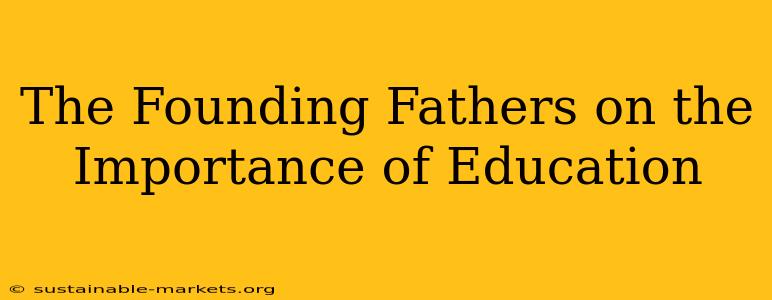The Founding Fathers of the United States understood the crucial role of education in building a strong and prosperous nation. Their writings and actions reveal a deep commitment to learning, not just as a means to personal advancement, but as the cornerstone of a thriving republic. This commitment wasn't merely lip service; it underpinned their vision for a self-governing society where informed citizens could participate meaningfully in their own governance. Their belief in education extended beyond the simple acquisition of facts and figures; it encompassed the cultivation of critical thinking, moral reasoning, and civic virtue.
Why Did the Founding Fathers Value Education?
The Founding Fathers believed that an educated citizenry was essential for a functioning democracy. They feared an ignorant populace susceptible to manipulation and tyranny. Their arguments for widespread education weren't based on abstract ideals alone; they saw practical applications in a society striving for self-determination. An educated populace, they reasoned, would be better equipped to:
- Understand their rights and responsibilities: Knowledge of the Constitution, the laws of the land, and the principles of self-governance was seen as paramount. Without this understanding, citizens risked being exploited or oppressed.
- Participate effectively in government: An informed electorate could make better choices at the ballot box and hold their elected officials accountable. This active participation was viewed as vital for a healthy republic.
- Contribute to economic prosperity: Education was seen as a driver of innovation, economic growth, and individual success. A skilled and knowledgeable workforce was crucial for national competitiveness.
- Promote social stability and harmony: Education was believed to foster tolerance, understanding, and cooperation amongst citizens, mitigating social unrest and conflict.
What Kind of Education Did the Founding Fathers Advocate For?
The Founding Fathers didn't envision a monolithic educational system. Their vision encompassed a broad range of approaches tailored to different needs and circumstances. However, some common themes emerged:
- Emphasis on classical education: Many Founding Fathers championed a classical education, emphasizing the study of ancient Greek and Roman literature, history, and philosophy. This was seen as crucial for cultivating critical thinking, moral reasoning, and an understanding of human nature.
- Importance of practical skills: Alongside classical learning, they also recognized the need for practical skills, particularly in agriculture, commerce, and the trades. This reflects their pragmatic understanding of the economic realities of their time.
- Access to education for all (ideally): While the reality fell short of the ideal, many Founding Fathers expressed a belief in the importance of making education accessible to all, regardless of social standing. This ideal, though imperfectly realized in their time, laid the foundation for future struggles for educational equity.
What role did religion play in the Founding Fathers' view of education?
The Founding Fathers held diverse religious beliefs, ranging from deism to various forms of Christianity. While some saw religion as a crucial moral compass in education, others emphasized the importance of secular learning. However, there was a general consensus that education should instill strong moral character and civic virtue, regardless of religious affiliation. The emphasis was on developing responsible and engaged citizens.
How did the Founding Fathers' views on education influence the development of the American education system?
The Founding Fathers' commitment to education laid the groundwork for the development of public education in the United States. Though the establishment of a nationwide system took time, their vision of an informed and engaged citizenry drove efforts to establish schools and colleges throughout the young nation. Their legacy continues to influence debates about the purpose and nature of education in America today. The ongoing discussions regarding curriculum, funding, and access to education directly relate to the ideals and concerns expressed by the Founding Fathers centuries ago.
What were the limitations of the Founding Fathers' views on education?
It's crucial to acknowledge the limitations of the Founding Fathers' perspectives on education. Their vision often excluded significant portions of the population, including women, enslaved people, and indigenous communities. The reality of their time fell far short of their stated ideals of universal access and equal opportunity. This historical context is essential in understanding both the brilliance and the flaws inherent in their thinking on this vital subject. Recognizing these limitations allows us to critically assess their legacy and strive for a more inclusive and equitable educational system today.
In conclusion, the Founding Fathers' emphasis on education wasn't just a matter of personal enrichment; it was a fundamental pillar of their vision for a self-governing republic. Their legacy continues to resonate in modern discussions about the role of education in shaping a just and prosperous society. By understanding their beliefs and acknowledging the complexities of their era, we can better appreciate the enduring importance of education in a democratic society.

